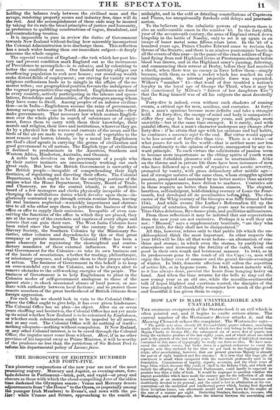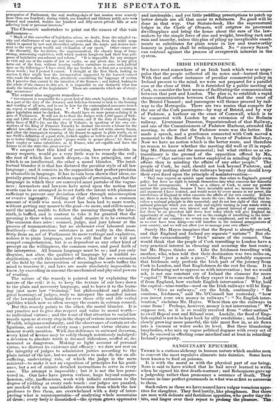HOW LAW IS MADE UNINTELLIGIBLE AND UNAVAILABLE.
THE enormous overgrowth of the Statute-book is an evil which is often pointed out, and it begins to excite serious alarm. The current number of the Westminster Review attacks it, and the Morning Chronicle echoes the complaint. The Westminster says " The public acts alone already fill five-and-thirty quarto volumes, measuring nearly three yards in thickness; of which two feet only belong to the period from Magna Charts to George HL; the subsequent six or seven feet of quarto law; being the exclusive produce of the last eighty years, and of which about one-third part is the growth of the last twenty years. Of the number of individual statutes contained in this mass of typography we really can form no idea. We have measured the outside covers' but broke down in a patient endeavour to count the separate acts they enclosed by the time we got back to the beginning of this reign; after ascertaining, however, that our present gracious Majesty is already the parent of eight hundred and five statutes! It is true that this huge pile of enactment is small when compared with the materials professedly used in its foundation. Commissions of inquiry, reports, accotutts, and the whole mass or huge folios which decorate fifty yards of -shelf in the Reform Club, and which are mainly the offspring of the Reformed Parliaments, could hardly be expected to' produce less than a tithe of fruit. It would be improper to question whether flit august assemblies which have made the country pay for the collection of all this knowledge, at an enormous cos; have read it themselves? The vacations are doubtlessly devoted to its perusal; and the mind is lost in admiration at the concentration—at the analytical and intellectual power which, having first digested these leviathan tomes, can afterwards mould and enact laws for the empire at the rate of a statute per night. Deducting Sundays, Saturdays, recesses idle Wednesdays, and eeneungs-oet, from the interval between the asaeniblini and
prorogation of Parliament, the real worloing-dafs of last session were scarcely *ore than one hundred; during which, one hundred and thirteen public acts were framed and enacted, besides one hundred and fifty-seven private bills or acts affecting local or personal interests."
The Chronicle undertakes to point out the causes of this vain diffuseness " Much of this cacoethes of legislation arises, no doubt, from the mingled vanity and shallowness of our age and time; somewhat, also, from the wider scope which is opened by new and diversified subjects, and the wants and desires incident to the very great wealth and civilization of our epoch." Other causes are "the obscurity, the involution, the ungrammatical, the chaotic heap of longstrung, unmeaning expletives, with which modern lawgivers lard their lean purposes of legislative amendment and reform." "It is impossible for any stranger to visit any one of the courts of law or equity, on any given day, in any given term out of the four, without hearing endless variations to some such judicial time as the following= I have tried, like my brother A, to find out a meaning in these words ; but I protest I cannot. I thought at the first blush, looking to section 3, they might bear the interpretation suggested by the learned counsel who made the motion: but then, attentively considering the language of section 23, 1 perceive that cannot be the intention of the framers ; and indeed, looking to the whole of the clauses in this act, it is impossible to say distinctly what was really the intention of the Legislature.' These are comments which are of everyday occurrence.'
The censor also suggests remedies
" Government is responsible for a great deal of this crude legislation. It should be a part of the duty of the Attorney and Solicitor-General to look to the framing and wording of all acts, and to see in how far the contemplated measures trench on, repeal, or modify existing laws. a * * The spirit of crude and commonplace legislation must be checked. We should have no more penny-a-lining it in acts of Parliament It will not do to flood the Judges with 1,500 pages of foolscap and 1,000 acts of Parliament every session; and if the duty of washing the dirty linen of M.P.'s (to use the idea of Voltaire, in speaking of his own corrections of the King of Prussia's French) be deemed too severe a labour for the official law-officers of the Crown—if they cannot or will not write sinewy Saxon, and allow the transparent meaning of the framer to appear in plain words2 or, to Inc Swift's definition of a good style, (which applies as well to acts of Parliament as to better things,) will not place proper words in proper places,' let them at least employ or name substitutes, as in France, who are capable and have the leisure to do the state this great service: We suspect that this kind of revision, however desirable in many respects, would go a very little way to remedy the evil ; the root of which lies much deeper,—in two principles, one of which is an intellectual, the other a moral blunder. The intellectual blunder it is that has dictated the peculiar style of all law language ; and it consists in the supposition that perfect precision is attainable in language. It has in vain been shown that ideas, especially general ideas, are seldom capable of precision, and that the language in which they are conveyed must partake of the vagueness: lawmakers and lawyers have acted upon the notion that words can be so arranged as to set forth the intent with plainness sufficient to prevent any deviation either through misconception or evasive ingenuity. Failing of that object when a common amount of words was used, resort has been had to more words, without getting any nearer to the goal—to more, and still to more ; until the mind, unable to follow the meaning through the labyrinth, is baffled, and is content to take it for granted that the meaning is there when occasion shall require it to be extracted. The occasion does arise : counsel, judge, and jury labour at the process of transmutation ; but no alchemist ever laboured more fruitlessly—the precious substance is not really in the dross. Strip from an act of Parliament its mere verbiage and expletives, reduce it to plain language, and you still find that it will not compel comprehension, but is as dependent as any other kind of precept on the willingness, the common sense, and good faith of the interpreter. All human language must be so ; and you only disguise, not alter' the qualities of language by a tenfold reduplication' —with this incidental effect, that the mere extension of the field by the interposition of meaningless words baffles the mind to traverse it ; and laws are made absolutely impossible to know, by exceeding in amount the mechanical and physical powers of reading.
The nature of the remedy is pointed out by explaining the nature of the evil : it is, to keep the texture of our laws down to the plain and necessary language, and to leave it to the learning (not mere law "learning," but philosophical and philological learning) of judges, truly to interpret the manifest intent of the lawmaker ; banishing for ever those silly and idle verbal quibbles which now so often occupy the courts in solemn council.
But this remedy points to the other, the moral blunder. It is our practice not to give due respect and value to moral worth— to individual virtues ; and the want of that attention to social law recoils upon us at every step in the shape of serious inconveniences. Wealth, religious conformity, and the observance of certain set obligations, are exacted of every man : personal virtue obtains no honour worth mention. With due deference to outward decorum, every kind of licence may be safely though notoriously indulged: a devotion to absolute truth is deemed ridiculous, scoffed at, denounced as dangerous. Making so light account of personal virtue, we distrust its existence and efficacy: we dare not rest on the integrity of judges to administer justice according to the plain intent of the law, but we must strive to make the law an allsufficing, undeviating rule, of which the judge is the mere minister—to make it not an exposition of principles for his guidance, but a set of minute detailed instructions to serve in every case. The attempt is impossible ; but it is not the less persevered in. Our laws have grown verbose, huge beyond comprehension, silly, inefficacious, weak with infinite extension to the degree of yielding at every rude touch : our judges are puzzled, are mocked with an unavoidable discretion from which the law professes to free them, are overwhelmed with a duty of interpreting what is uninterpretable—of analyzing whole mountains of dross; every body is dissatisfied--thesystem.grows oppressive and intolerable; and yet little peddling proscriptions to patch up better details are all that occur to reformers. No good will. be done in that way. Our Statute-book, like the supernatural lodger in the Castle of Otranto, will outgrow its procreant dwellingplace and bring the house about the ears of the lawmakers by the simple force of size and weight, breeding rack and ruin and anarchy, unless this plan of piling up inexplicable enact...! merits as substitutes for plain sense in law and trustworthy honesty in ,judges shall be relinquished. No "sinewy Saxon" can contend against the process of overgrowth inherent in the system.























































 Previous page
Previous page